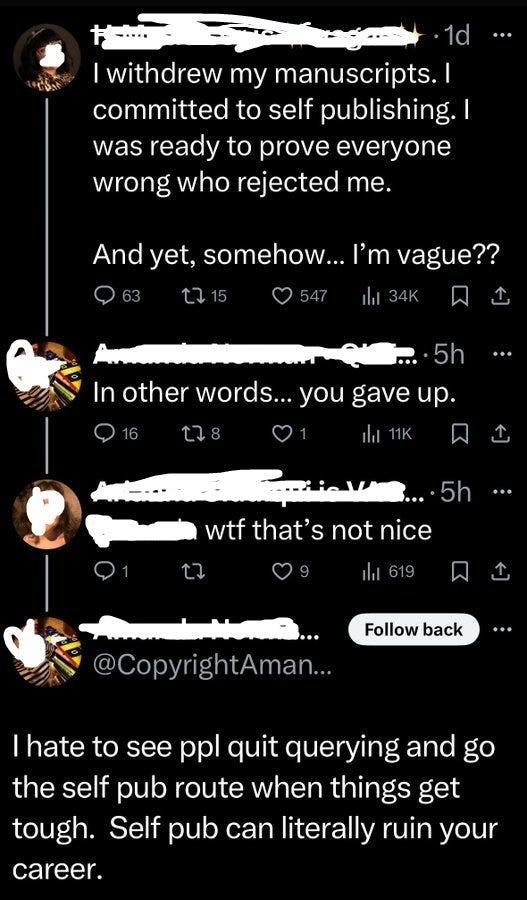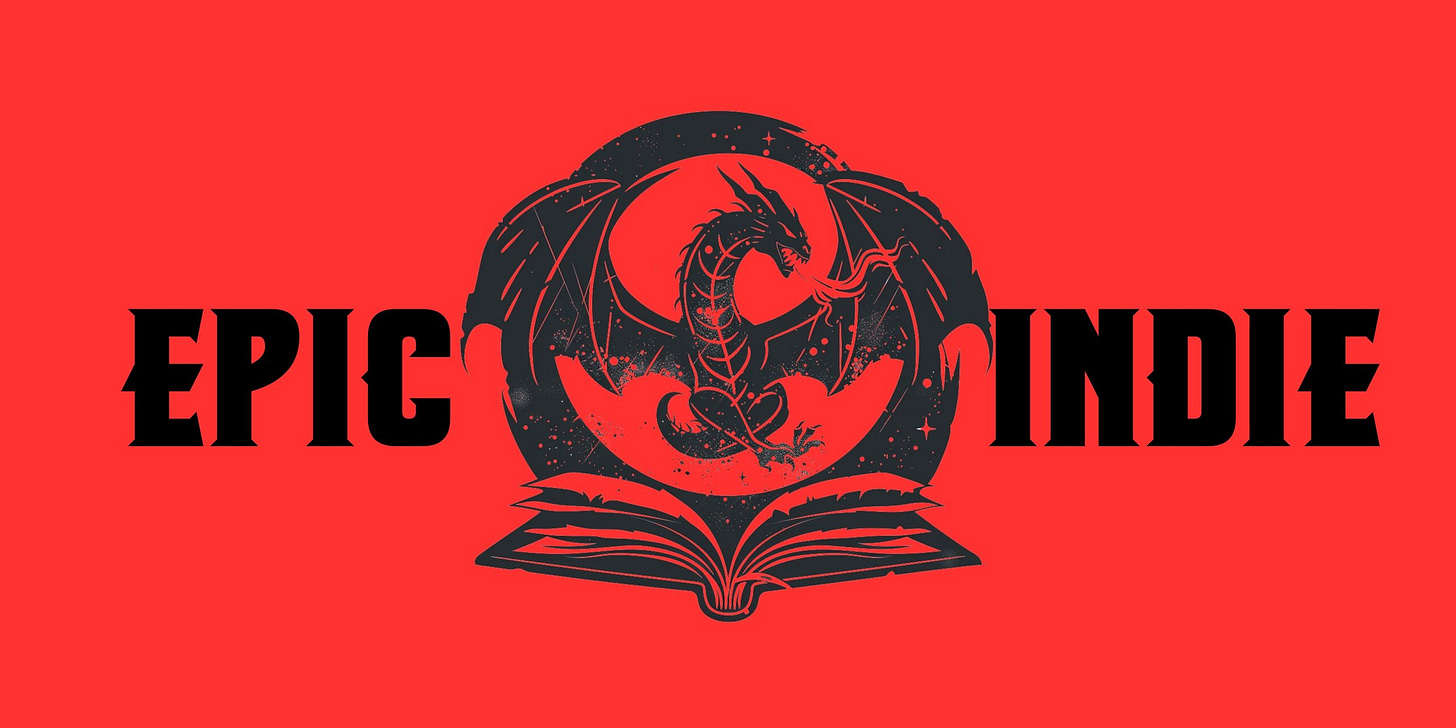As an author myself I see it all the time, snobs and ignoramous sneering at indie and self pubbed authors. As I was perusing X the other day I saw yet another terrible take when it comes to self publishing. They claimed it was ‘giving up’, well, as someone who’s been doing this for a decade now I can safely say that going down this path is far from giving up.
Self-publishing is as a powerful and legitimate option, far removed from the notion of "giving up." In fact, self-publishing can be the ultimate act of empowerment for authors. Here’s why:
1. Creative Control and Freedom
Self-publishing grants authors complete control over their work. From the storyline and cover design to the marketing strategy, every decision rests with the writer. This creative freedom ensures that the author’s vision remains uncompromised. Traditional publishing often requires writers to make concessions to fit market demands or editorial preferences, but self-publishing allows for pure, unfiltered storytelling.
2. Speed to Market
Traditional publishing can be a lengthy process, sometimes taking years from manuscript submission to book release. In contrast, self-publishing enables authors to bring their work to readers much faster. Once the manuscript is polished, it can be published within weeks or even days. This speed to market is particularly beneficial for timely or topical works, allowing authors to stay relevant and responsive to current trends.
3. Higher Royalties
Financially, self-publishing can be more rewarding. Traditional publishers typically offer royalties between 10-15% of the book’s sales price. Self-published authors, however, can earn up to 70% of the sales price on platforms like Amazon Kindle Direct Publishing. This higher percentage can make a significant difference, especially for books that sell well.
4. Access to Global Markets
Self-publishing platforms have a global reach, allowing authors to connect with readers worldwide. Whether through e-books or print-on-demand services, self-published books can be available in multiple countries with just a few clicks. This access to international markets is a tremendous advantage, broadening the potential readership beyond geographical boundaries.
5. Building a Personal Brand
Self-publishing offers the opportunity to build a personal brand. Authors can engage directly with their readers, develop a loyal following, and create a brand identity that resonates with their audience. This direct relationship can lead to more meaningful connections and a deeper understanding of what readers enjoy, driving future projects and marketing strategies.
6. Innovative Marketing Opportunities
Self-publishing opens up a world of innovative marketing possibilities. Authors can leverage social media, blogs, podcasts, and email newsletters to promote their books. They can also experiment with pricing strategies, special offers, and exclusive content to attract and retain readers. This direct engagement with marketing efforts allows for a more tailored and effective approach.
7. Proving Market Viability
For new authors, self-publishing can serve as a proving ground. Success in self-publishing can demonstrate a book’s market viability, making it more attractive to traditional publishers if the author wishes to pursue that route later. It shows that there is a demand for the author’s work and that they can build an audience on their own.
8. Community and Support
The self-publishing community is vibrant and supportive. Numerous online forums, groups, and resources are available to help authors navigate the process. From writing tips and marketing advice to emotional support and networking opportunities, self-published authors are never truly alone on their journey.
Self-publishing is far from a fallback option for authors; it is a dynamic and empowering choice. It offers creative control, faster time to market, higher financial rewards, global reach, and innovative marketing opportunities. Moreover, it allows authors to build personal brands and engage directly with readers. Embracing self-publishing is not about giving up—it’s about taking control and forging your own path in the literary world. So, if you’re an aspiring author, consider the immense possibilities that self-publishing can offer. Your story deserves to be told, and self-publishing might just be the perfect way to share it with the world.







People are still repeating that party line? The Harper-Collins lawsuit proved that self-pub is just as good as trad-pub. They admitted that most books sell less than 1000 copies and the majority of those sell less than 100. There are no marketing departments, no big advances, no way of even selling books except Barnes and Noble. The few big advances are paid only to tried and true moneymaker authors, who, by the way, handle all their own marketing and fanbase building themselves (see Brandon Sanderson). The new author might as well learn to do it all themselves. And honestly, publishing a fanfic on fanfiction for net is harder to do that publishing on Amazon or Draft2Digital.
I've commercially published a three book series with Putnam/Berkley. I commercially published a novel with Thomas Dunne. But... it became harder and harder to publish. My last commercially published book was in 2004. Since then I wrote six more. To get my first book published (after I had written it) took about four years. from my search for an agent, till the book appeared in book stores. My other book, published with Thomas Dunne, took about 12 years to find a publisher. Things are much worse now. Now, if you include the time for finding an agent, then the agent finding a house, it can take two, five, or more years. You occasionally read about someone finding a publisher after ten years. If you're 29, waiting ten years for your book to find a home is awful, but doable. If you're 76, like I am, it's bullshit. It's ridiculous. It's also cruel, I believe.
There are a lot of reasons certain writers seem to go straight in the house, and others barred entry, told 'I'm sorry, but your project does not sound like a fit for me at this time, and so I will have to pass. Thank you for considering me and best of luck with your future queries.'
BTW, I've received dozens of the above. And the other 125 agents/agencies I've queried don't even reply. I've also spent about $250.00 in 'entry fees' over the last year entering my book in 'publishing contests: ''Danzc, Sarabande Books, New American Press, The Letter Review Prize, Black Lawrence Press, Prairie Schooner Raz-Shumaker Book Prize Contest, Steel Toe Books, C&R Press, Autumn House Press, The Masters Review, Red Hen Press, and others. If you win, they publish your book and you get a $1500.00 advance on average. I haven't won, although I garnered one 'longlisted' and one 'shortlisted.' I've been on a campaign for the last 15 months to find an agent, or a publishing house, for my latest book. So, at some point, deciding to self-publish is the only way forward. Is that giving up? I don't think so. But it's all that there is for some writers who, by virtue of their race, sexuality, political views, etc., are anathema to Big Publishing.
Why did you spend so much time trying to publish commercially, some will ask. Well, any book that is 'self-published' is considered second tier, not good enough, or just garbage, by Big Literati. Any book self-published, will not be reviewed by the six remaining book reviewers. It will not appear in any book club brochure. It will literally take years, maybe five or more, just to get a decent following. It will eventually wind up on Amazon in slot number 6, 783, 287.
Am I sad? No. I'm pissed. But I will never give up. Let Big Publishing continue to seek out and publish woke bullshit. Let them slowly go out of business.
I wish I could be encouraging and uplifting in my analysis but that would be a lie.